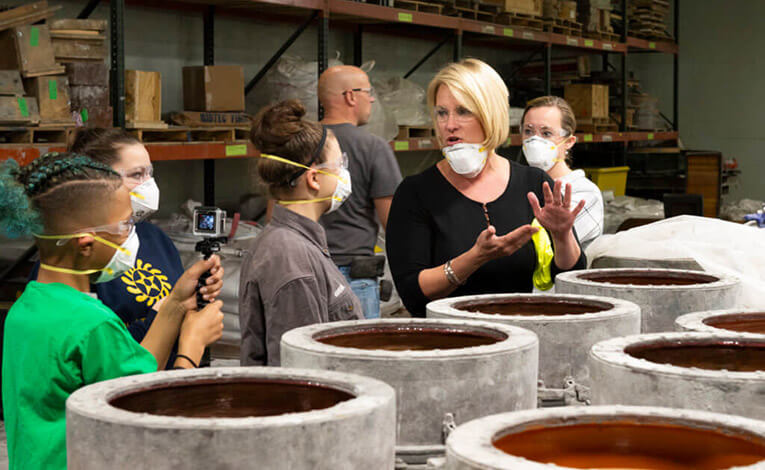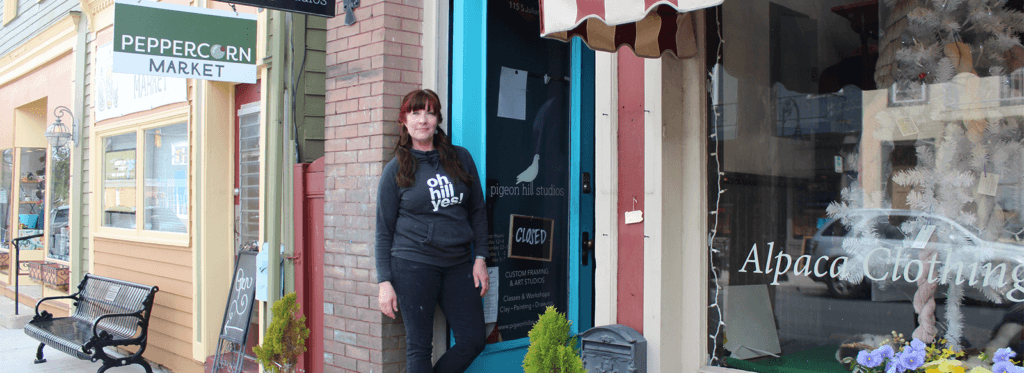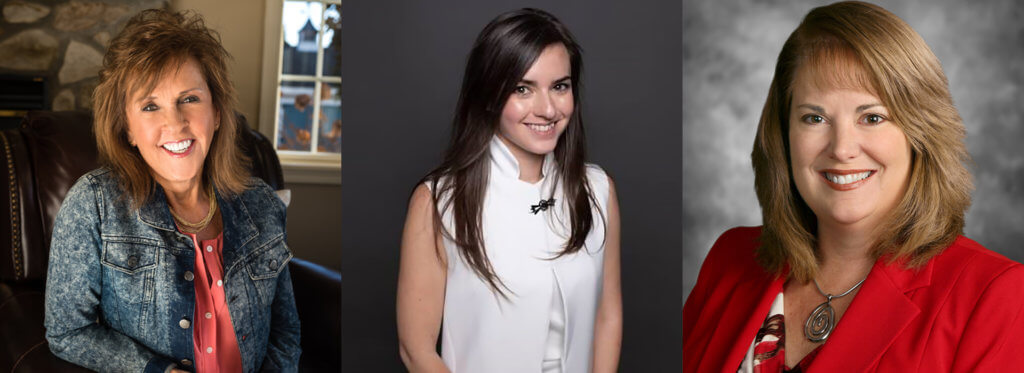How One PA Woman is Trailblazing Manufacturing for Future Generations

In 2013, Onex — a western PA-based, family-owned manufacturer that specializes in industrial furnace production and maintenance — was in trouble. The company, which had been operating in Pennsylvania for more than fifty years, needed a major turnaround to stay in business. Ashleigh Walters was asked to take on the formidable task of becoming the general manager. It not only required resolving the company’s financial woes, but a complete change of the company’s culture as well.
Thankfully, Walters was up to the challenge. She had a plan to turn Onex around — part of which involved tapping into resources from the Northwest Industrial Resource Center (NWIRC) tailored for Onex’s needs as a smaller company. The NWIRC is one of seven not-for-profit industrial resource centers (IRCs) across Pennsylvania supported by the Pennsylvania Department of Community & Economic Development that help small to mid-sized manufacturers grow, thrive, and continue to be a vital part of Pennsylvania’s economy. Thanks to the Manufacturing PA Initiative, the IRCs have expanded their outreach to small and medium-sized businesses to support manufacturing and link job training to career pathways.
“My first order of business was to implement a new accounting system,” Walters said. “We turned to the IRCs for a mini-grant to offset the cost of the accounting system. They have phenomenal resources that really helped us as a small business that doesn’t have dedicated internal staff for services like safety, marketing, and information technology. We look to NWIRC to vet those types of service vendors for us, and to introduce and define our project needs to them. They really provide connection.” Walters, who became president in 2017, has been instrumental in establishing both herself and the company as a forward-thinking regional leader in the manufacturing sphere. Thanks to the IRCs, she found assistance for several initiatives that improved processes and workforce quality and helped her move the company forward.
Another key resource was NWIRC’s workforce development services, which helped Walters provide customized training for Onex workers — something that continues to be a key component of the company’s workforce strategy today.
“We utilized several of the IRCs’ services to improve our workforce development, such as customized training.” Walters said. “We don’t fit in a box, and it’s extremely useful to have available training in areas like customer service that we can tailor to fit our company’s needs. We’re a part of their Lean Together™ group, which aims to strengthen our workforce and improve our operations. Additionally, they’ve introduced us to marketing vendors who have helped us achieve quality brand awareness and to establish ourselves as leaders in our industry.”
Walters was no stranger to the manufacturing industry, having grown up in a family of manufacturers herself. However, industrial furnaces wasn’t a field in which she initially planned to build her career.
“I grew up in Tennessee and was part of a multigenerational manufacturing family: my grandfather and father both worked in the paper industry,” Walters said. “I excelled at math and science, and though I was considering going to school to teach those subjects, my mother suggested that I explore engineering instead.”
However, by the early-to-mid 2000s, the pulp and paper job market became almost nonexistent. Walters went to work in the nuclear power industry instead. Her husband’s father, who owned Onex at the time, hired her in technical sales in 2003. She was promoted to general manager in 2013, and subsequently took over as Onex’s president in 2017.
Walters’ work has marked a major evolution of the company from its origins as a refractory materials distribution business. In the past, Erie was full of foundries. Fast forward to today, and Onex is mainly a service company. It now installs more than it distributes in refractory materials across the tri-state area, and these installations compose roughly fifty percent of its business. It also manufactures furnaces for forging and heat. Foundry production has decreased from 100 percent of Onex’s business to only 10 percent, while forging and heat treating for aerospace and defense are now roughly 50 percent of the revenue.
Walters wanted to help other regional manufacturing companies grow and thrive as the industry continues to evolve, which is why she joined the area’s Next Generation Regional Partnership, which was launched in November 2018. She was one of four manufacturers in the Northwest region to sign a letter that went out to regional manufacturers telling them about local opportunities and inviting them to be a part of a partnership and help carry the industry forward. Since then, more than 30 companies have become actively engaged in the partnership.
“Pennsylvania really has its roots in steel as a state,” Walters said. “I’m proud to continue to be part of that steel industry with all the advances that we have in technology. Our mission is to improve our manufacturing and keep small town USA alive.”
Walters is also leading the way in promoting manufacturing as a career across the region at career day events, company trainings, and school workshops.
“I use problem-solving skills as a lead-in to manufacturing careers,” Walters said. “I love the work I do because I solve problems every single day, and they’re never the same. I’ve done Kata in the Classroom, which teaches a problem-solving method to kids in the classroom and connects problem solving to real-life STEM applications. The kids work together, and I use that to talk to them about how every career in manufacturing needs problem-solving skills. I’m also involved in the What’s So Cool About Manufacturing Contest. Several years ago we had six kids visit our company, and we put together hands-on activities in all the different areas, including electricians, safety, molding, and marketing.”
When Walters asked the students involved in the contest why they chose to participate, they answered that they had wanted to learn more about the industry. However, after digging a bit deeper, she found a trend — one that her own career mirrored.
“I learned that a lot of these kids already had parents, friends, or relatives already working in the manufacturing industry, so I think exposure to the industry is key. There’s not a lot of awareness currently, and awareness is the biggest thing that manufacturers can do to get that next generation of workforce.”
Walters continues to increase that awareness across the region through her leadership and involvement with the community and local industry — and, of course, the IRCs. As an individual bringing new perspectives to her family’s manufacturing business, Walters’ story shows the next generation the many career opportunities that the manufacturing industry has to offer.
Learn more about the Pennsylvania Industrial Resource Center Network to see if they can help your company grow in PA. Continue to stay up-to-date on all Pennsylvania company news by following us on Twitter, LinkedIn, and Facebook.

Mrs. Ashleigh Walters is the President of Onex Inc. Onex is a woman-owned, second-generation family business and has been in operation for over 52 years. Onex designs, services, and manufactures high temperature industrial furnaces. Its mission is to help its clients dramatically improve their operational performance, thereby increasing their success, creating jobs, and keeping small town USA alive. Mrs. Walters holds a B.S. in chemical engineering from Auburn University. She is Vice Chairman of the Board of Directors for Northwest Industrial Resource Center (a Manufacturing Extension Partnership) as well as Women in Manufacturing Western PA Chapter.





